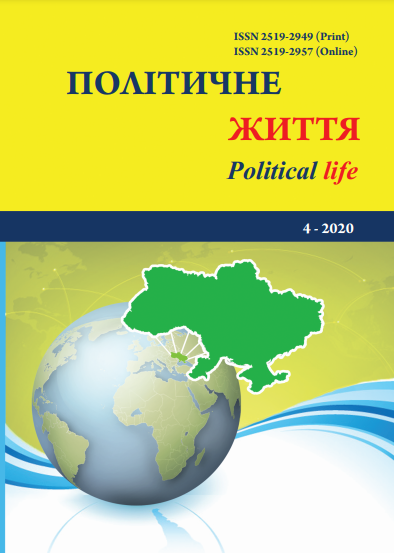Theoretical dimension of political opposition as a modern phenomenon
DOI:
https://doi.org/10.31558/2519-2949.2020.4.5Keywords:
political opposition; protest movements; nonconformism; resistance; dissent; factionalism; socio-political movements and organizations; theoretical and methodological analysis; theoretical dimension; political practiceAbstract
Substantiation of the modern phenomenon of «opposition», its forms, types of manifestation and functioning is an important theoretical and methodological problem, the solution of which is necessary not only and not so much political science as political practice.
The relevance of the chosen topic lies in the need to define political institutions, practices and processes that outline the parameters of efficiency and institutionalization of the political opposition in the political and legal context in its theoretical justification and measurement.
Political science in the context of political opposition has become much more heterogeneous since the 90s of the twentieth century, because it was at this time that it began to focus on the phenomenon under study analytically, comparatively and on the example of a growing number of cases.
In the context of the Visegrad countries, this was especially relevant, because, on the one hand, they have now acquired the format of the process and inter-institutional relations, which has expanded understanding of the nature and types, forms and indicators, and the general structure of political opposition, including at the expense of the Visegrad countries. This course of events has also played a huge role in the development of regional studies on the political opposition, even though they are still relatively underrepresented and unsystematized. The fact is that the fact of democratization of the region was a kind of divide between studies of the proto-opposition (including resistance, dissent and socio-political movements and organizations) or political opposition (including systemic, especially parliamentary and anti-systemic) in conditions, respectively, autocratic and democratic political regimes.
It should be noted that a similar situation, especially against the background of Western political science, is typical of Ukrainian political science, in which the issue of political opposition is still mainly theoretical and descriptive, but very little analytical and comparative, and therefore not multifaceted. In view of this, it is justified that further progress should be made on the understanding, structuring and typology of the political opposition, both theoretically and methodologically and practically empirically.
References
Кольцов В. М. Особливості становлення та структуризації політичної опозиції в країнах Вишеградської групи. Дис. ... д. політ. н.: спеціальність 23.00.02 – політичні інститути та процеси. Одеса: Університет Ушинського, 2020. 628 .
Берестова Г. Опозиція як форма прояву політичного протесту. Науковий часопис НПУ імені М. П. Драгоманова. 2014. Вип. 15. С. 84–89.
Бондар С. Теоретико-методологічні засади дослідження феномену політичної опозиції. Вісник Дніпропетровського університету. Серія: Філософія. Соціологія. Політологія. 2015. № 1. С. 24–32.
Бусленко В. Природа кооперативної взаємодії влади та опозиції в умовах лібералізації політичного режиму (на прикладі Польщі та Угорщини). Панорама політологічних студій. 2015. Вип. 13. С. 125–131.
Варзар І. Політологічні і історіологічні засади феномена «політична опозиція». Політична опозиція: теорія та історія, світовий досвід та українська практика. Київ, 1996. С. 94–102.
Вінничук Н. Типологія політичної опозиції. Політичний менеджмент. 2007. № 3. С. 51–59.
Древаль Ю. Інституалізація парламентської опозиції. Актуальні проблеми державного управління. 2009. № 1. С. 35–42.
Зубрицька Д. Політична опозиція як атрибут демократичного суспільства. Вісник Львівського університету. Серія: філософська. 2009. Вип. 12. C. 194–200.
Ільницька У. Парламентська опозиція як інституційний аспект контрольної функції парламенту. Українська національна ідея: реалії та перспективи розвитку. 2008. Вип. 23. 76–85.
Михальченко М. Взаємодія політичної влади і опозиції як політологічна проблема. Сучасна українська політика і політологи про неї. Київ: Ін-т держави і права ім. В. М. Корецького, 2002. С. 20–33.
Оськін О. Євроскептицизм: основні типи опозиції до ідеї європейської інтеграції. Дослідження світової політики: Зб. наук. пр. 2009. Вип. 48. С. 26–33.
Пеньковська Н. Інституціоналізація парламентської опозиції як складова підвищення ефективності урядування. Актуальні проблеми політики. 2014. Вип. 53. С. 259–267.
Шведа Ю. Вибори та виборчі системи. Європейські стандарти та досвід для утвердження демократії в Україні. Львів: Вид-во Тараса Сороки, 2010. 462 с.
Кольцов В. Теоретико-методологічні підходи та проблемно-предметні ракурси дослідження політичної опозиції у сучасній західній політичній науці. Вісник Дніпропетровського університету. Серія: Соціологія. Філософія. Політологія. 2016. № 5. С. 42–48.
Falk B. The Dilemmas of Dissidence in East-Central Europe: Citizen Intellectuals and Philosopher Kings. Central European University Press, 2003. 479 p.
Barker R. Studies in Opposition. Basingstoke, London: Macmillan, 1971. 338 p.
Brack N., Weinblum S. "Political Opposition": Towards a Renewed Research Agenda. Interdisciplinary Political Studies. 2011. Vol. 1. No. 1. P. 69–79.
Brack N., Weinblum S. What do we mean by "political opposition": a theoretical perspective. Presented at Potsdam ECPR General Conference, 9–12 September 2009. 16 p.
Norton P. Making Sense of Opposition. The Journal of Legislative Studies. 2008. Vol. 14. No. 1. P. 236–250.
Kerr H. The Structure of Opposition in the Swiss Parliament. Legislative Studies Quarterly. 1978. Vol. 3. No. 1. P. 51–62.
Кольцов В. Дистинкція методологічних і теоретико-методологічних підходів щодо дослідження політичної опозиції. Держава і право. 2017. № 75. С. 4–14.
Parry G. Opposition Questions. Government and Opposition. 1997. Vol. 32. No. 4. P. 457–461.
Brack N., Weinblum S. "Political Opposition": Towards a Renewed Research Agenda. Interdisciplinary Political Studies. 2011. Vol. 1. No. 1. P. 69–79.
Sartori G. Concept Misformation in Comparative Politics. American Political Science Review. 1970. Vol. 64. No. 4. P. 1033–1053.

